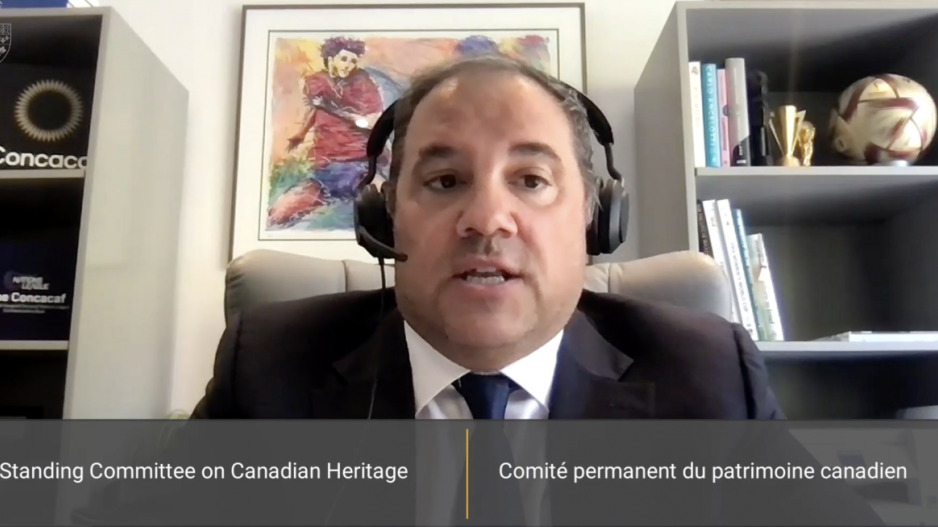A West Â鶹´«Ã½Ó³»resident – one of FIFA’s eight vice-presidents – told members of Parliament Thursday that he was not interviewed by the FIFA committee that was looking into the case of a former Canadian Soccer Association (CSA) coach jailed for sexually assaulting players.
“I was never asked anything by the FIFA ethics committee,” testified Victor Montagliani, who is also president of FIFA’s North and Central America and Caribbean zone known as CONCACAF.
“The FIFA ethics committee made a clear statement, that their investigation had to deal with the individuals, Mr. Birarda, specifically, being involved. So I was never asked anything by the FIFA ethics committee.”
Bob Birarda, a former head coach of Canada’s under-20 national team and assistant coach with the senior national team, was sentenced to 16 months of jail in November for crimes committed between 1988 and 2008. He wasn’t charged until late 2020, after former Whitecap Ciara McCormack blew the whistle about Birarda’s return to coaching teenage girls.
Montagliani was a member of the CSA board in 2008 when players complained about Birarda’s behaviour, including sexualized text messages. In his testimony via web conference to the Canadian Heritage committee, Montagliani said he remembered conference calls to suspend Birarda and to hire a lawyer to investigate.
“The second conference call weeks later dealt with the recommendation by the investigator, through our president, to confirm that there will be no police [investigation] undertaken in this matter, unfortunately,” Montagliani told the MPs. “That there was also the texting that was confirmed that was inappropriate for a coach-player relationship, and that also, that the identity of the players or player involved, as well as the details of the texting, was not revealed to the committee because of privacy and confidentiality.”
Birarda also coached the Whitecaps’ entry in the W-League. In October 2008, the club and the CSA both announced Birarda’s departure in what they called a “mutual parting of ways.”
“We only dealt with the sole allegation of his inappropriate texting at a national team camp in Vancouver,” Montagliani testified. “And that was the process of that investigation with respect to what he has subsequently been charged with, which came in light in 2019/2020. Those predated his time at the Canada Soccer Association, when he committed those things while working at the grassroots or at private academies in British Columbia. In 2008, nobody was aware, I was certainly not aware of anything previously that Birarda had done.”
Last July, University of Western Ontario sports law professor Richard McLaren issued a damning report that said nobody from the CSA was directing or overseeing Birarda and the organization misled the public about his departure.
“The CSA executive committee’s intent to terminate Birarda was communicated as a ‘mutual parting of ways’ which mischaracterized, if not glossed over, the real circumstances surrounding his departure,” McLaren wrote.
Earlier in the hearing, MP Anthony Housefather (Liberal-Mount Royal) pressed Montagliani to reveal how much he is paid, but Montagliani refused.
“The issue is that with the organization that I am the president of has a policy with respect to not disclosing that number,” Montagliani said, claiming non-disclosure was for security and safety reasons.
The former insurance executive lives in a West Â鶹´«Ã½Ó³»mansion assessed at almost $6.4 million. Montagliani, who became CSA president in 2012, was elected CONCACAF president in 2016 and bought the property in 2017, when CONCACAF reportedly paid him US$2 million.
Housefather also grilled Nick Bontis, who resigned as CSA president on Feb. 27, about his reported $125,000 payment for membership on the CONCACAF council.
Bontis said he was “uncomfortable in sharing” what he earns for privacy reasons. He said that during this 11 years on the CSA board, he was a volunteer.
Bontis revealed that the CSA’s marketing and broadcast deal with privately owned Canadian Soccer Business, which players have called one-sided, could last 20 years.
“The frame of reference for me, personally, in 2017 and 2018, when we were negotiating the deal, was that we need a long time to actually provide resources for a league to sustain itself,” said Bontis, a business professor at McMaster University. “Three previous men's league, CSL, CNSL, CPSL, historically, all went belly-up within that 10-year period.”
Bontis was under fire in February after the national women’s team, the reigning Olympic champions, threatened to strike for pay equity. The forum of provincial association presidents demanded he step down while he was in Guatemala with the national under-17 boys team.
He said he unsuccessfully asked for a meeting to hear their reasons.
“I was not afforded that opportunity. So at that point, I tendered my resignation,” Bontis said.



